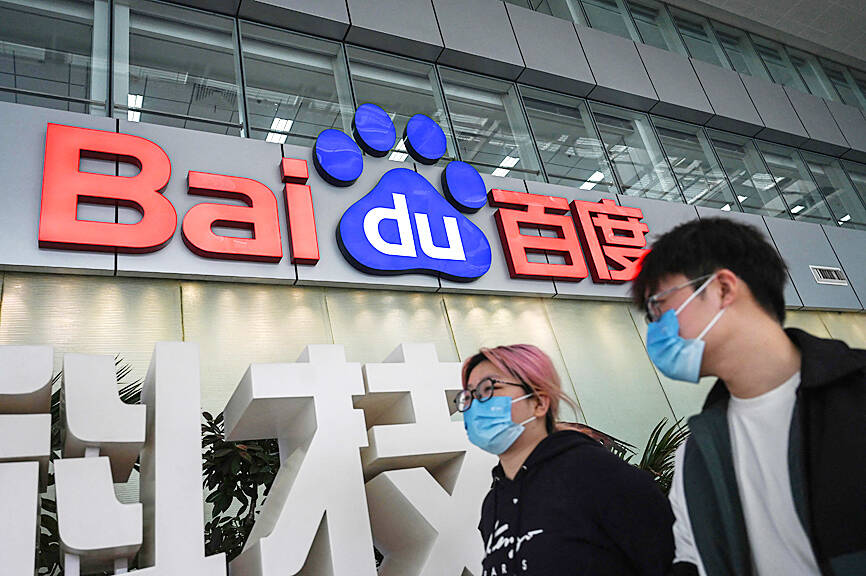Chinese Internet search giant Baidu Inc (百度) yesterday released a new artificial intelligence (AI) reasoning model and made its AI chatbot services free to consumers as ferocious competition grips the sector.
Technology companies in China have been scrambling to release improved AI platforms since start-up DeepSeek (深度求索) shocked its rivals with its open source and highly cost-efficient model in January.
In a post on WeChat, Baidu announced the launch of its latest X1 reasoning model — which the company claims performs similarly to DeepSeek’s but for lower cost — and a new foundation model, Ernie 4.5.

Photo: AFP
Baidu also made its AI chatbot Ernie Bot free for individual users more than two weeks ahead of schedule. Previously, users had to pay a subscription to access the company’s latest AI models via Ernie Bot.
Ernie 4.5 “outperforms” US-based OpenAI’s GPT-4.5 model in “multiple benchmarks,” while Ernie X1 features “enhanced capabilities in understanding, planning, reflection and evolution,” Baidu said.
The Beijing-based company was one of China’s first to roll out a generative AI platform publicly, in 2023, but rival chatbots from companies such as TikTok owner ByteDance Ltd (字節跳動) and Moonshot AI Technology Co (月之暗面) have since gained more users.
Baidu faces stiff competition in the consumer-facing AI sector where DeepSeek shook up the industry at home and abroad with a model that performed comparably to competitors such as US-made ChatGPT, but cost much less to develop.
Last month, WeChat owner Tencent Holdings Ltd (騰訊) released a new AI model that it claimed answers queries faster than DeepSeek, even as it incorporated its rival’s technology into its messaging platform.
The same month, Alibaba Group Holding Ltd (阿里巴巴), which has partnered with Apple Inc to develop AI for the US company’s phones in China, said it would invest 380 billion yuan (US$52.5 billion) in AI and cloud computing over the next three years.
Alibaba this month also released a new version of its AI assistant app powered by its open-source Qwen reasoning model.

Nvidia Corp chief executive officer Jensen Huang (黃仁勳) on Monday introduced the company’s latest supercomputer platform, featuring six new chips made by Taiwan Semiconductor Manufacturing Co (TSMC, 台積電), saying that it is now “in full production.” “If Vera Rubin is going to be in time for this year, it must be in production by now, and so, today I can tell you that Vera Rubin is in full production,” Huang said during his keynote speech at CES in Las Vegas. The rollout of six concurrent chips for Vera Rubin — the company’s next-generation artificial intelligence (AI) computing platform — marks a strategic

REVENUE PERFORMANCE: Cloud and network products, and electronic components saw strong increases, while smart consumer electronics and computing products fell Hon Hai Precision Industry Co (鴻海精密) yesterday posted 26.51 percent quarterly growth in revenue for last quarter to NT$2.6 trillion (US$82.44 billion), the strongest on record for the period and above expectations, but the company forecast a slight revenue dip this quarter due to seasonal factors. On an annual basis, revenue last quarter grew 22.07 percent, the company said. Analysts on average estimated about NT$2.4 trillion increase. Hon Hai, which assembles servers for Nvidia Corp and iPhones for Apple Inc, is expanding its capacity in the US, adding artificial intelligence (AI) server production in Wisconsin and Texas, where it operates established campuses. This

Garment maker Makalot Industrial Co (聚陽) yesterday reported lower-than-expected fourth-quarter revenue of NT$7.93 billion (US$251.44 million), down 9.48 percent from NT$8.76 billion a year earlier. On a quarterly basis, revenue fell 10.83 percent from NT$8.89 billion, company data showed. The figure was also lower than market expectations of NT$8.05 billion, according to data compiled by Yuanta Securities Investment and Consulting Co (元大投顧), which had projected NT$8.22 billion. Makalot’s revenue this quarter would likely increase by a mid-teens percentage as the industry is entering its high season, Yuanta said. Overall, Makalot’s revenue last year totaled NT$34.43 billion, down 3.08 percent from its record NT$35.52

PRECEDENTED TIMES: In news that surely does not shock, AI and tech exports drove a banner for exports last year as Taiwan’s economic growth experienced a flood tide Taiwan’s exports delivered a blockbuster finish to last year with last month’s shipments rising at the second-highest pace on record as demand for artificial intelligence (AI) hardware and advanced computing remained strong, the Ministry of Finance said yesterday. Exports surged 43.4 percent from a year earlier to US$62.48 billion last month, extending growth to 26 consecutive months. Imports climbed 14.9 percent to US$43.04 billion, the second-highest monthly level historically, resulting in a trade surplus of US$19.43 billion — more than double that of the year before. Department of Statistics Director-General Beatrice Tsai (蔡美娜) described the performance as “surprisingly outstanding,” forecasting export growth